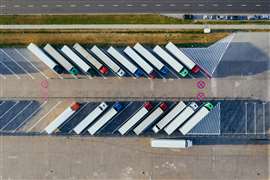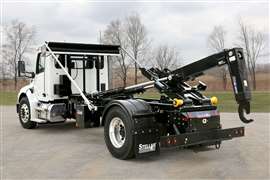Read this article in Français Deutsch Italiano Português Español
Street Smarts: Misgivings and magical thinking
04 April 2024
With a top-to-bottom reworking of trucking less than three years away, the industry is nowhere near ready
 Photo: Marcin Jozwiak/Pexels.com
Photo: Marcin Jozwiak/Pexels.com
Early March saw the first important industry trade show of 2024 when The Technology and Maintenance Council held its Annual Meeting in New Orleans. TMC has always been an important indicator of the state of play in the North American trucking industry, and this year it felt as if there was a bit of a cloud hanging over the show.
Attendance was up, sessions were crowded and spirited discussions took place as usual. But it was hard to shake off the reality that after many years looming over the horizon, the 2027 Phase 3 Greenhouse Emissions regulations are coming at the industry hard and fast.
2027 will be the year that changes trucking forever. And the grim reality is that the vast majority of commercial fleets are nowhere near ready for the massive transition coming at them like an express train in a darkened railroad tunnel.
There’s not going to be a last-minute magic bullet to save the day. There’s not going to be an apples-to-apples, clean fuel, heavy-duty engine with diesel-like performance ready by 2027. No politician or government is suddenly going to come forward and make it all go away.
Still, fleets will try to stave off the inevitable as long as they can. That’s why most industry observers think a massive diesel truck prebuy will begin later this year. This will be fleets’ last chance ever to get the kinds of diesel trucks they know and rely on.
The rush to get the final models that will ever be built will likely ignite a white-hot commercial vehicle market that will burn like a supernova until January 2027. And then, like a burned-out star, the market will most likely constrict violently as truck sales drop off a cliff. It’s anyone’s guess how long this recession will last; several years is the general consensus. Sales will remain stagnant while fleets wring every last possible mile out of their pre-2027 trucks and wait to see what prices, performance and technological improvements take place with new zero-emission truck models.
Economy rides on getting it right
As I walked through the show and talked to attendees, it was hard for me escape the notion that – in all honesty – commercial trucks are being asked to make this transition all alone with very little outside help. I can’t escape the feeling that we, as a nation, aren’t really taking this transition seriously enough.
Case in point: New battery-electric trucks perform well in short- to regional-haul applications, but they are still exorbitantly expensive compared to diesel models. There is no charging infrastructure to speak of anywhere in the country. Installing private charging infrastructure is outrageously expensive, as well. And outside of CARB states, incentives and rebate programs to help fleets acquire new zero-emission trucks are virtually nonexistent.
And – oh yeah: We still don’t have a viable green-fuel alternative for long-haul trucking applications. It looks like hydrogen fuel cell technology might get us close to long-haul diesel performance. But, once again, serious questions remain about the price of these trucks and the nonexistent fueling infrastructure they’ll need when they do hit the road.
Our entire economy is literally riding on getting the transition of commercial vehicles to zero-emissions technology right. And if something doesn’t change soon, we could be looking at a supply chain disaster that makes the still-lingering COVID-19 disruptions look like child’s play.
A case of “Magical Thinking”
This is a presidential election year. And that only adds to the apprehension, of course. But no matter what happens this November, we are fast approaching the point when the federal government, and the entire country, is going to have to step up and give fleets real, tangible help to make the transition away from fossil fuels.
 Jack Roberts is a Tuscaloosa, Ala.-based independent journalist and licensed commercial driver with more than 20 years’ experience covering the North American and global trucking industries.
Jack Roberts is a Tuscaloosa, Ala.-based independent journalist and licensed commercial driver with more than 20 years’ experience covering the North American and global trucking industries.
I’m no policy wonk, so I don’t know what that kind help can or should look like. But I do think some form of realistic national grants, incentives and real funding programs for fleets is what needs to happen. Of course, such a program would be incredibly expensive. But then so too would a collapse of our trucking supply chain and the emergency measures that would be required to fix such a calamity.
Each passing week, I am more and more convinced that when it comes to 2027, we are dealing with a national case of “Magical Thinking.”
We’ve all encountered Magical Thinking at one point or another in our lives: When a group of leaders or an organization decides that reality and the rules don’t apply to them. The usual idea is that an organization’s can-do spirit and some hard work will overcome any obstacles and everything will work out fine!
That’s not going to happen in 2027. Diesel engine manufacturers and truck OEMs have done a commendable job in bringing viable new technologies to the market. Beginning next year, the impetus to transition to clean fuel powertrains will increasingly fall on private fleets. Expecting OEMs, manufacturers and fleets to absorb the punishing costs associated with developing and adopting these entirely new transportation technologies and carry on with business as usual is Magical Thinking of the highest order.
We all want a cleaner, greener future for our children and grandchildren. But the trucking industry needs help if it’s going to take us there. And if that help doesn’t come soon, we could be looking at a very real economic crisis before this decade is out.
POWER SOURCING GUIDE
The trusted reference and buyer’s guide for 83 years
The original “desktop search engine,” guiding nearly 10,000 users in more than 90 countries it is the primary reference for specifications and details on all the components that go into engine systems.
Visit Now
STAY CONNECTED




Receive the information you need when you need it through our world-leading magazines, newsletters and daily briefings.
CONNECT WITH THE TEAM













